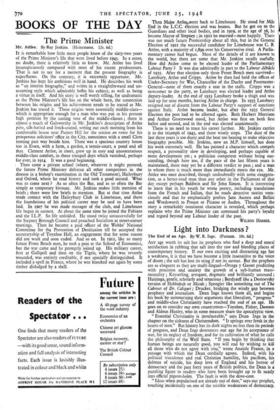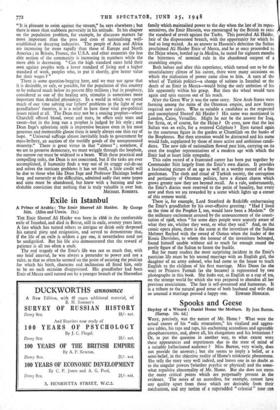Light into Darkness ?
The End of an Age. By W. R. Inge. (Putnam. 10s. 6d.)
ANY age worth its salt has its prophets who find a deep and moral satisfaction in rubbing that salt into the raw and bleeding places of contemporary history. If our own exciting and distracting age has a weakness, it is that we have become a little insensitive to the voice of doom ; the salt has lost its sting if not its savour. But the prophets are as eloquent as they are multi-lingual--Ortega y Gasset predicting with precision and anxiety the growth of a sub-human mass- mentality ; Keyserling, arrogant, dogmatic and brilliantly unsound ; Huizinga, gentle, scholarly and tenacious ; Berdyaeff like a Dostoevsky version of Habbakuk or Micah ; Spengler like something out of The Cabinet of Dr. Caligari ; Drucker, bridging the windy gap between prophecy and journalism. Dean Inge knows them all, and begins his book by summarising their arguments that liberalism, " progress " and middle-class Christianity have reached the end of an age. He goes on to consider our own countrymen—Toynbee, Fisher, Dawson and Aldous Huxley, who in some measure share the apocalyptic view.
" Essential Christianity is invulnerable," says Dean Inge in the chapter on the sickness of Christendom. " It springs ever fresh in the hearts of men." But history has its dark nights no less than its periods of progress, and Dean Inge denounces our age for its acceptance of war, for its neglect of freedom, and for its cultivation of what he calls the philosophy of the Wolf State. " If you begin by thinking that human beings are naturally good, you will end by wishing to kill all those who do not agree with you," wrote Anatole France; in a passage with which the Dean cordially agrees. Indeed, with his political truculence and real Christian humility, his pacifism, his defence of suicide, his deep love of England and his horror of democracy and the past forty years of British politics, the Dean is a puzzling figure to readers who have been brought up to fit neatly into official pigeon-holes. The fault is with the dovecote.
" Ideas when popularised are already out of date," says our prophet, touching incidentally on one of the terrible weaknesses of democracy. " It is pleasant to swim against the stream," he says elsewhere ' • but there is more than stubborn perversity in his attitude. In his chapter on the population problem, for example, he discusses matters far more important than the pros and cons of nationalising well- established or decaying industries. The people of Asia and Africa are increasing far more rapidly than those of Europe and North America ; in Britain, France, the U.S.A. and other countries the less able section of the community is increasing in numbers while the more able is decreasing. " Can the high standard races hold their own against peoples with a lower standard of living and a higher standard of work, peoples who, to put it shortly, give better value for their wages ? "
There is some question-begging here, and we may not agree that it is desirable, or safe, or possible, for the population of this country to be reduced much below its present fifty millions ; but in prophecy, considered as one of the healing arts, stimulus is sometimes more important than detailed physiology. In a world in which we spend much of our time solving our fathers' problems in the light of our grandfathers' theories, it is a relief to have these" vital pre-political issues raised at all. The Dean may not be a rousing prophet—where Churchill offered blood, sweat and tears, he offers only tears and sweat—but in the long run a prophet is judged by his style ; and Dean Inge's aphoristic style is impressive because even in his most generous and memorable gloom there is nearly always one thin ray of hope. " Universal suffrage almost inevitably leads to government by mass-bribery, an auction of the worldly goods of the unrepresented minority." There is great virtue in that " almost " ; somehow, if we are to preserve democracy, we must wriggle through the loophole, the narrow ray must be widened to a beam. With these practical and compelling tasks the Dean is not concerned, but if the tasks are ever accomplished, if humanity fords a way out of its craggy cul-de-sac and solves the intricate problems it has set itself, a little credit will be due to those who like Dean Inge and Professor Huizinga looked long and earnestly at the difficulties, admitted sadly that some hopes and aims must be abandoned, but knew with a burning and un- shakable conviction that nothing that is truly valuable is ever lost.
MICHAEL ROBERTS.































 Previous page
Previous page